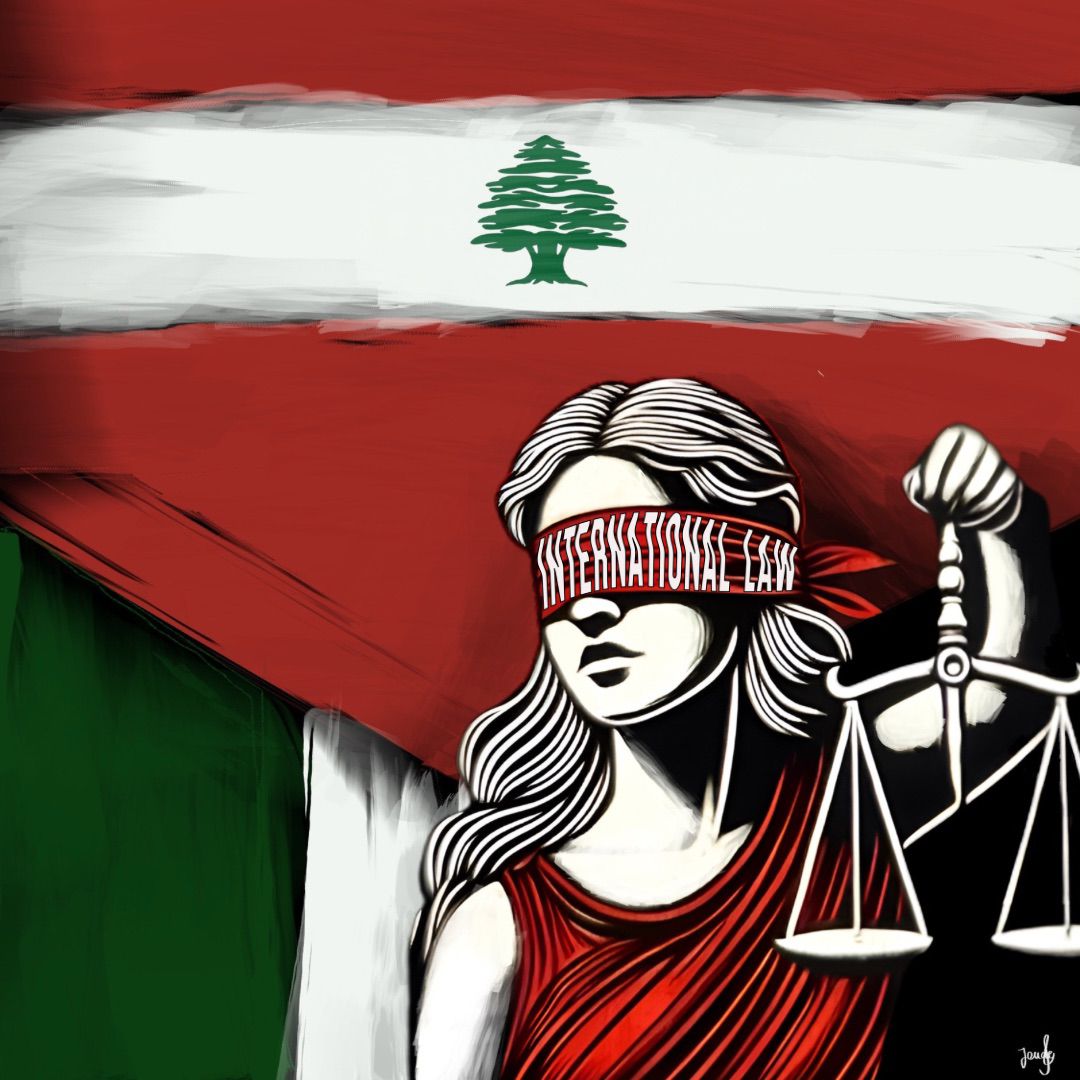Strategizing from 7 cities across the globe
Rise of Impunity: The Fall of International Law
It may come as a surprise to you that even wars have rules. Unfortunately there have not been any red lines in the recent ones. It is imperative to mention that Israel ratified the Genocide convention in 1948 and the Geneva Convention in 1951, prohibiting war crimes as well as any attempt of ethnic cleansing. Although Israel could not formally ratify the Hague Regulations that focus on crimes against humanity, most of their principles match Israel’s customary international law.
ACADEMICWARMIDDLE EASTINTERNATIONAL LAWUNITED NATIONS
Selena Bassil, Kim-Lynn Abi Haila
10/25/20245 min read


Design by Joude Abou Hamdan
Human rights in Lebanon and Gaza are a matter that transcend the national borders and resonate as a universal tragedy. Innocent people are the silent victims of prolonged conflict and endless distress. We are witnessing flagrant violations of the most basic human rights through collective punishment: torture, displacement, psychological trauma, systematic deprivation of necessities, among many others. The ongoing situation is more than just a war, it is a humanitarian crisis.
Violations of international law:
It may come as a surprise to you that even wars have rules. Unfortunately there have not been any red lines in the recent ones. It is imperative to mention that Israel ratified the Genocide convention in 1948 and the Geneva Convention in 1951, prohibiting war crimes as well as any attempt of ethnic cleansing. Although Israel could not formally ratify the Hague Regulations that focus on crimes against humanity, most of their principles match Israel’s customary international law. After reading the aforementioned, if you still think international law is anything but a lie, think again. Since the start of the war with Lebanon and Gaza, Israel has:
· Destroyed homes, allowing bodies of innocents to vanish
· Targeted ambulances, hindering medical assistance.
· Attacked members of the press, restricting media coverage and freedom of speech.
· Targeted churches, violating places of worship.
· Threatened the Red Cross, Red Crescent, and Firefighters who were merely fulfilling their duties, murdering many necessary societal members .
· Used explosive devices on more than 2,000 people doing everyday things.
· Threatened and injured UNIFIL peacekeepers on the southern borders of Lebanon.
The abovementioned horrors only partially reflect what the Lebanese and Palestinian populations have suffered in the past year. Although the world has recognized these as violations of international law, nothing has been done to stop these actions. We still hear the words “Israel has the right to defend itself”. Usually, breaking international law signifies the United Nations Security Council (UNSC) to take immediate action. The UNSC consists of five permanent members who have veto power and vote on substantial issues. These countries include China, France, the United Kingdom, The United States, and Russia. When a country breaks international law, the expected outcome is for the perpetrator to be sanctioned. The Security Council members must impose economic sanctions, diplomatic pressure, and/or referral to the International Criminal Court (ICC). According to the Foreign Minister of Lebanon, Mr. Abdallah Bou Habib, he has submitted various complaints to the UNSC but he has not received any responses yet. While this shocks recent generations, it is worth mentioning that this is not the first time the country violates customary international law and gets away with it. Examples include the Nakba, the Six-Day War, the First and Second Intifadas in Gaza, and the wars in Lebanon in 1982, 2000, and 2006.
You may ask yourself, how has Israel been able to get away with its terrorism, not only today, but for as long as it has been established?
Role of the international community:
Logically, given the numerous violations of international law by the Israeli government and the IDF, one would expect the international community to hold them accountable. However, this has not been the case. The ongoing conflict has exposed a deeply cynical moment for international law. As of October 7, 2023, almost every norm of international humanitarian law has been violated, and yet, over a year later, the war continues to escalate. While international bodies issue statements calling for action, their failure to take meaningful steps toward incentivizing change reveals a stark hypocrisy. For instance, the United States called for a ceasefire on October 15, 2024. Still, it then vetoed a UN resolution calling for an immediate ceasefire on October 22, 2024, and even suggested that Israel has 'no red lines'—despite international law clearly defining those boundaries. The US’s complicity runs deeper: After the October 7, 2023, Hamas attack, this pattern of protection continued, as Washington refused to push Israel to lift its blockade, even amid a mounting humanitarian crisis. These actions expose the shield being used to prevent Israel from facing accountability. In July 2024, when the case of Palestine against Israel was brought before the International Court of Justice (ICJ), the US refused to vote on sanctions against Israel, ensuring no meaningful action to stop the horror. They provided over $20 billion in military aid to the IDF, including precision-guided munitions used in the airstrikes in Gaza. This invites reflection on the inherent bias of international law: Are these laws only enforced against weaker nations? Is Israel effectively above the law?
Impunity:
The international community’s failure to take decisive action is directly fueling Israel’s impunity, allowing the situation to escalate unchecked. As global bodies remain passive, Israel is emboldened to continue its violations, knowing there will be no real consequences. This lack of accountability has become a dangerous enabler, encouraging further escalation and perpetuating the cycle of violence. By neglecting to enforce international law, the international community is complicit in allowing Israel’s aggressive policies to persist, leading to more deaths and devastation. This inaction only motivates the IDF to push forward, as Israel faces no meaningful deterrence for its actions. The world proclaims “never again,” a solemn vow rooted in the horror of the Holocaust, where millions perished in the face of global indifference. But here it is, happening again. For decades, there has been an effort to eradicate impunity, but this silence allows it to thrive. Ironically, the commitment to prevent such atrocities is now rendered hollow as we witness similar cycles of violence against Palestinians and Lebanese civilians. How far will the international community allow Netanyahu’s government to go? How many more deaths? How much more suffering will the Lebanese and Palestinian people endure? The failure of international organizations to act decisively not only condones the violence but contributes to it. Every delay, every silence, adds to the torture, the displacement, and the destruction of lives.
Despite international law and the global community’s duty to end this nightmare, Israel continues to commit atrocities like an unstoppable war machine. It is clear that the country is incapable of being sanctioned, but that gives the children of tomorrow a chance to speak up and hopefully bring about change. To those who find themselves helpless in these situations, a lot can be done without spending a cent. Firstly, talking about it and spreading accurate information can bring us one step closer to justice. It may seem useless, but this is the only way of sending a message to those in power that the world is watching. Secondly, it is vital that every person becomes aware of the false narratives surrounding the topic. Everyone must correctly do their research concerning recent events, as Israel’s influence permeates even the simplest media stories. This ultimately makes you aware of why history is repeating itself, and how, as the next generation, we could change for the better. Finally, and most importantly, it is crucial that during these times, we learn to separate politics from humanity.
References
“Amid ‘Catastrophic, Unconscionable, Shameful’ Situation in Gaza, General Assembly President Underlines Need for Immediate Ceasefire” (March 4, 2024) | United Nations Meetings and Press Coverage
https://press.un.org/en/2024/ga12585.doc.htm
Experts hail ICJ Declaration on illegality of Israel’s presence in the Occupied Palestinian Territory as “historic” for Palestinians and international law | OHCHR. (n.d.-a). https://www.ohchr.org/en/press-releases/2024/07/experts-hail-icj-declaration-illegality-israels-presence-occupied
Lebanon Files Complaint at UN Security Council,
www.nna-leb.gov.lb/en/سياسة/606884/lebanon-files-complaint-at-un-security-council-for.
“Ocha Weekly Humanitarian Update Opt (29 June-5 July 2002) - Ocha Press Release - Question of Palestine.” United Nations, United Nations,
www.un.org/unispal/document/auto-insert-197598/.
“US Vetoes Gaza Cease-Fire at UN” (February 20, 2024) By Margaret Besheer | VOA news
https://www.voanews.com/a/un-security-council-vote-on-gaza-cease-fire-faces-us-veto/7494664.html
